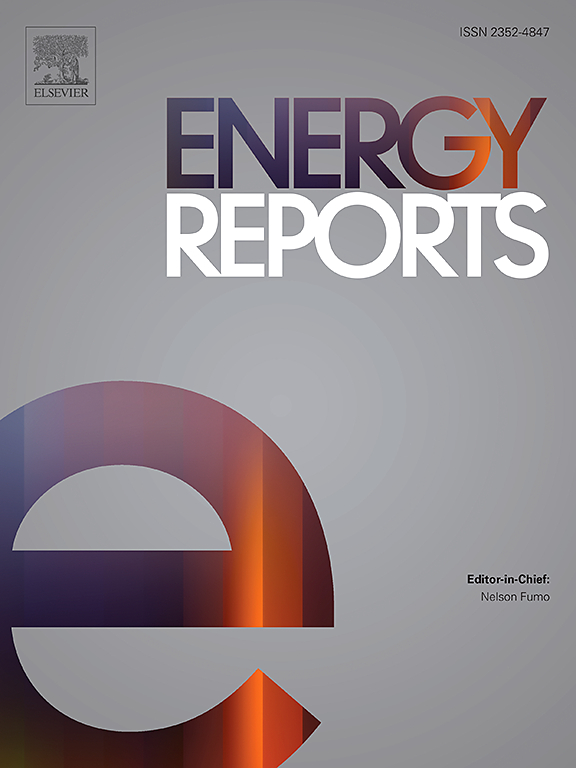支持物联网的光伏模块热和表面管理系统,以及圆柱形抛物面收集器
IF 5.1
3区 工程技术
Q2 ENERGY & FUELS
引用次数: 0
摘要
本研究展示了一种混合太阳能海水淡化系统的开发和验证,该系统集成了光伏(PV)面板、电池存储、水泵和热蒸馏装置,并通过复合抛物面聚光器(CPC)增强,以改进太阳能捕获。这项工作的新颖之处在于一个支持物联网(IoT)的全自动三维(3D)清洁和冷却机制,该机制由SOLIDWORKS设计,由ESP32微控制器控制,可根据环境条件进行实时操作。与传统系统不同,拟议的设计将粉尘检测、热调节和预测分析结合到一个统一的、低维护的平台中,适合离网应用。在匈牙利Gödöllő进行的现场实验表明,与未维护模块的850 W/m²相比,夏季峰值为950 W/m²,辐射捕获增加了8-15 %,日发电量提高了12 %,而效率在各个季节保持在±5 %。统计验证证实了预测准确度,决定系数(R²)在97.5 %和98.8 %之间,并得到其他性能指标的支持。这些发现突出了将基于物联网的自动化与混合光伏-圆柱形抛物收集器PV-CPC系统集成在一起的潜力,以确保可靠的全年运行。通过将自动清洁、热管理和实时监控相结合,本研究为可持续太阳能海水淡化技术建立了可扩展的基准,减少了维护需求,并支持在偏远和离网环境中持续生产能源和水。本文章由计算机程序翻译,如有差异,请以英文原文为准。
IOT-enabled thermal and surface management system for PV modules coupled with a Cylindro-Parabolic Collector
This study presents the development and validation of a hybrid solar-powered desalination system that integrates photovoltaic (PV) panels, battery storage, a water pump, and a thermal distillation unit, enhanced by a compound parabolic concentrator (CPC) for improved solar energy capture. The novelty of the work lies in an Internet of Things (IoT)-enabled, fully automated three-dimensional (3D) cleaning and cooling mechanism, designed in SOLIDWORKS and controlled by an ESP32 microcontroller, which enables real-time operation based on environmental conditions. Unlike conventional systems, the proposed design combines dust detection, thermal regulation, and predictive analytics into a unified, low-maintenance platform suitable for off-grid applications. Field experiments in Gödöllő, Hungary, demonstrated an 8–15 % increase in irradiance capture, with summer peaks of 950 W/m² compared to 850 W/m² for unmaintained modules, and a 12 % improvement in daily energy yield, while efficiency was maintained within ±5 % across seasons. Statistical validation confirmed predictive accuracy with coefficients of determination (R²) between 97.5 % and 98.8 %, supported by other performance metrics. These findings highlight the potential of integrating IoT-based automation with hybrid photovoltaic-cylindroparabolic collector PV-CPC systems to ensure reliable year-round operation. By combining automated cleaning, thermal management, and real-time monitoring, this study establishes a scalable benchmark for sustainable solar desalination technologies that reduce maintenance requirements and support continuous energy and water production in remote and off-grid environments.
求助全文
通过发布文献求助,成功后即可免费获取论文全文。
去求助
来源期刊

Energy Reports
Energy-General Energy
CiteScore
8.20
自引率
13.50%
发文量
2608
审稿时长
38 days
期刊介绍:
Energy Reports is a new online multidisciplinary open access journal which focuses on publishing new research in the area of Energy with a rapid review and publication time. Energy Reports will be open to direct submissions and also to submissions from other Elsevier Energy journals, whose Editors have determined that Energy Reports would be a better fit.
 求助内容:
求助内容: 应助结果提醒方式:
应助结果提醒方式:


